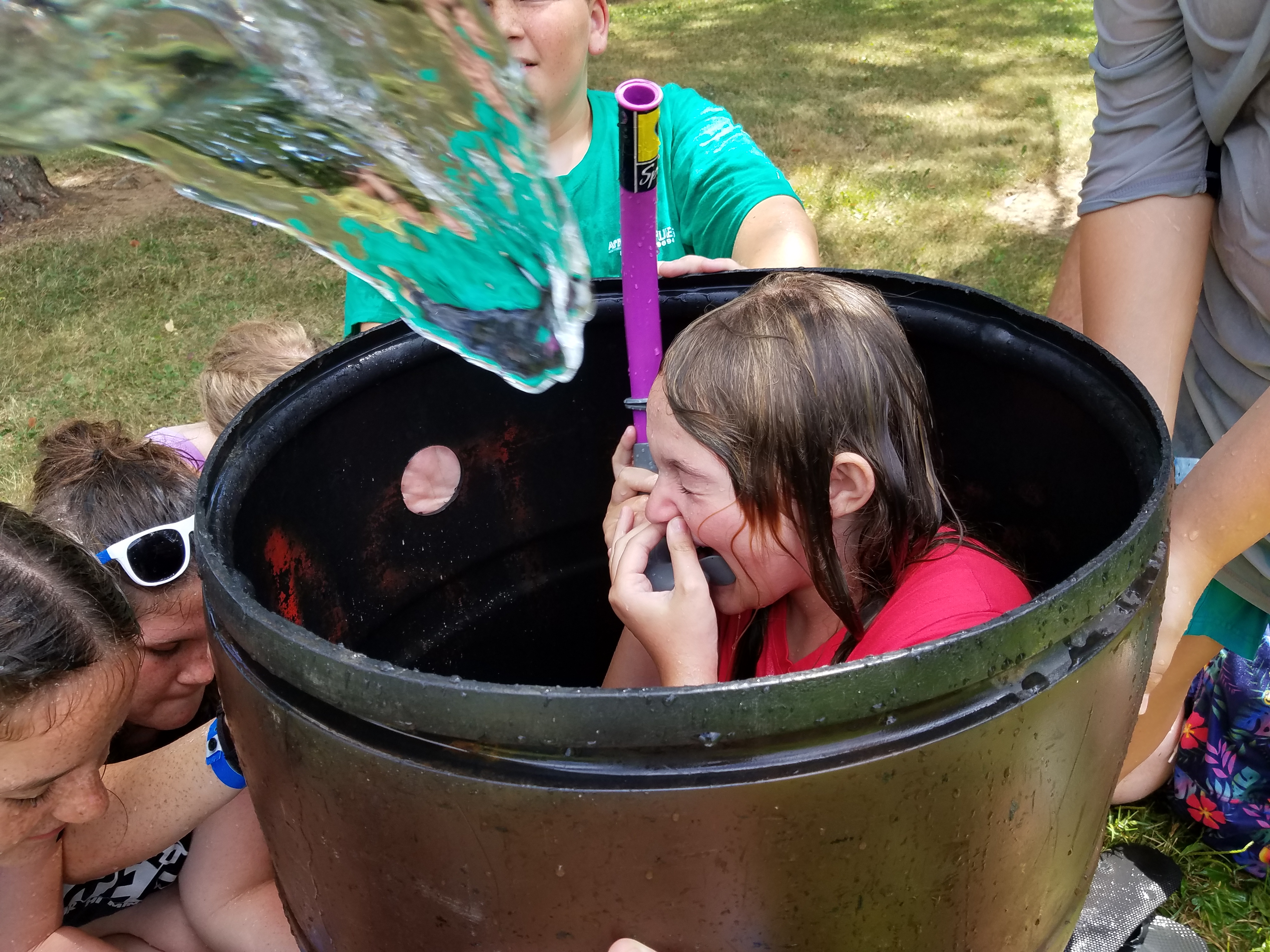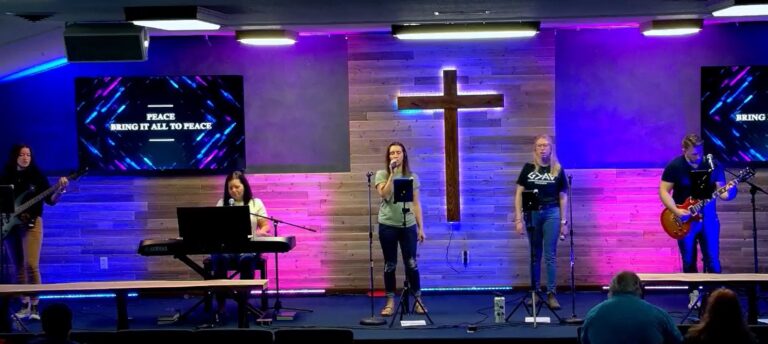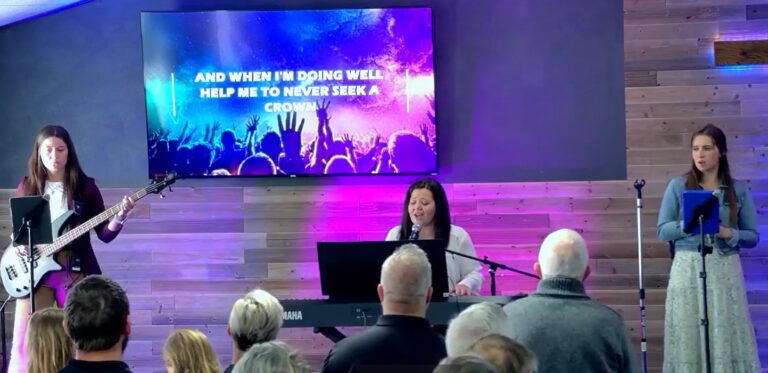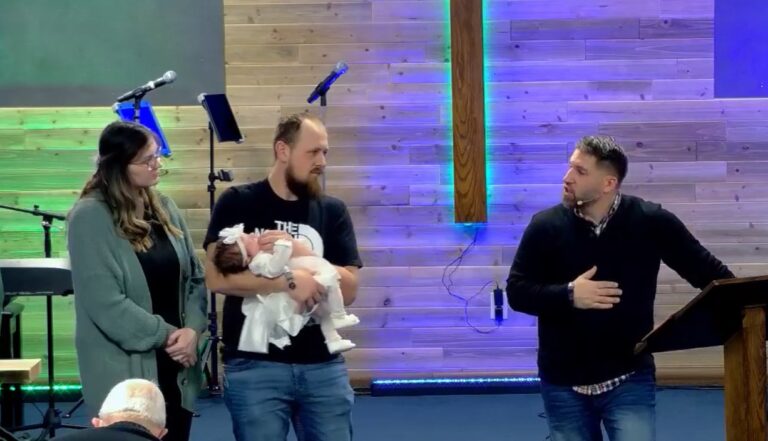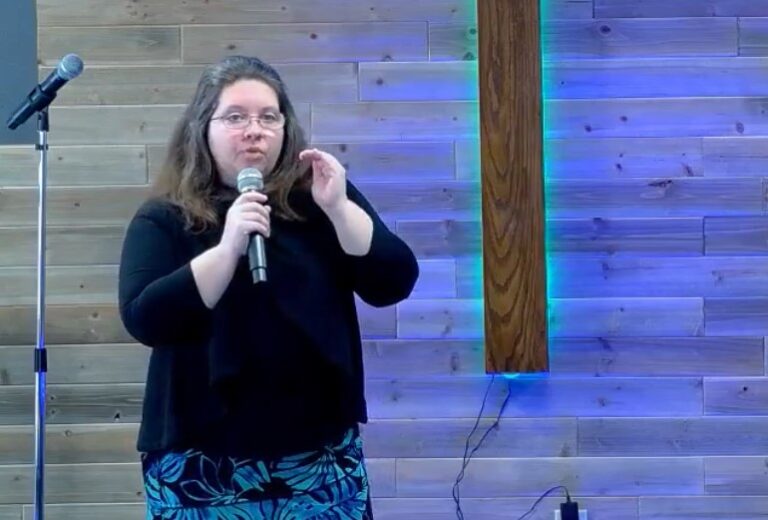After all the preparations, set-up and tear-down afterward, Family Camp 2020 is already in the rearview mirror. Port Ann Wesleyan was well-represented within the youth program. For details about the experience, photos and songs, click here.
The question after such a big event wears down usually boils down to two words … What’s next? How are we going to take what we learned and apply it, become better followers of Christ and ultimately help shine His light in a fallen world? To kick off this week’s lesson, here’s a song that addresses some of those questions, Matthew West’s “Do Something:”
Prayer needs continue to be a priority for all of us. Sally Sheets has gone through the second of her every-other-week chemo treatments. Please keep the whole family in prayer, including daughter Sherilyn, who has left Chicago for the time being to stay with her parents at the parsonage and help them through the process.
The Kuhns family is still picking up the pieces after the loss of Michael Kuhns following his North Carolina surgery and recovery processed originally seemed to go well. Trina Eia’s cancer situation has flared up again, and her whole family continues to need devoted prayer and assistance during this tough time. Pat Mitchell has additional health concerns and the Mitchell Farm is reeling from the lack of rain and its impact on their produce business.
Also, please pray for God’s provisions for those at family camp — the youth shared a wide variety of prayer needs and issues they are facing, and we want to remember everyone connected to our extended church/camp/godly family as they navigate the next steps.
And finally, for the COVID situation, impending school openings and all the decisions, modifications and unanswered questions surrounding what can already be a stressful time even in the best of circumstances.
As the case most weeks when it comes to preparing the youth lesson, God provides various elements that help support an important theme. Beyond the lessons we discussed at camp from the Book of Daniel and the locally based testimonies shared in the “Resolved” book we tackled, there were some important object lessons that unfolded during the week of camp.
One of those lessons, in the form of a conversation, combined with a newly released song by Casting Crowns and a different look at the well-known parable shared by Jesus about the prodigal son are the basis for this week’s session.
The conversation at camp involved longstanding resident campers vs. guests and whether a guest — even one who has paid for his/her time at camp — has the right to confront a resident camper about an issue. The implication was that those who are residents have more of a right to the privileges of camp, and there is a fine line where some of that line of thinking may be true, but if a guest is properly paid and justifiably making a point, the resident camper’s response could easily be misconstrued as elitist.
That sort of mentality doesn’t help the negative stereotype toward Christians that we are a group that judges and looks down on others. God’s kingdom isn’t a country club where those who spend the most money or devote the most time or effort deserve more accolades than those new to the faith, those with more baggage or those who may be struggling to find their spiritual footing.
That doesn’t make the concept any easier for some — including myself at times — to completely understand and embrace. Personally, for me, it ties in with the parable of the prodigal son — not about the prodigal son himself, so to speak, but his brother. Read over these verses from Luke 15:11-32 (NIV) with a look at the older son, especially his conversation with his father at the end of the passage:
Jesus continued: “There was a man who had two sons. The younger one said to his father, ‘Father, give me my share of the estate.’ So he divided his property between them.
“Not long after that, the younger son got together all he had, set off for a distant country and there squandered his wealth in wild living. After he had spent everything, there was a severe famine in that whole country, and he began to be in need. So he went and hired himself out to a citizen of that country, who sent him to his fields to feed pigs. He longed to fill his stomach with the pods that the pigs were eating, but no one gave him anything.
“When he came to his senses, he said, ‘How many of my father’s hired servants have food to spare, and here I am starving to death! I will set out and go back to my father and say to him: Father, I have sinned against heaven and against you. I am no longer worthy to be called your son; make me like one of your hired servants.’ So he got up and went to his father.
“But while he was still a long way off, his father saw him and was filled with compassion for him; he ran to his son, threw his arms around him and kissed him.
“The son said to him, ‘Father, I have sinned against heaven and against you. I am no longer worthy to be called your son.’
“But the father said to his servants, ‘Quick! Bring the best robe and put it on him. Put a ring on his finger and sandals on his feet. Bring the fattened calf and kill it. Let’s have a feast and celebrate. For this son of mine was dead and is alive again; he was lost and is found.’ So they began to celebrate.
“Meanwhile, the older son was in the field. When he came near the house, he heard music and dancing. So he called one of the servants and asked him what was going on. ‘Your brother has come,’ he replied, ‘and your father has killed the fattened calf because he has him back safe and sound.’
“The older brother became angry and refused to go in. So his father went out and pleaded with him. But he answered his father, ‘Look! All these years I’ve been slaving for you and never disobeyed your orders. Yet you never gave me even a young goat so I could celebrate with my friends. But when this son of yours who has squandered your property with prostitutes comes home, you kill the fattened calf for him!’
“‘My son,’ the father said, ‘you are always with me, and everything I have is yours. But we had to celebrate and be glad, because this brother of yours was dead and is alive again; he was lost and is found.’”
I sort of empathize, at times, with the older son. He didn’t violate his father’s inheritance. He stayed loyal to the father throughout the story, and yet the younger son is the one who receives the fanfare treatment and lavish party. It just doesn’t seem fair.
The new song from Casting Crowns called “Start Right Here” dropped on YouTube this weekend, and it is pretty powerful in challenging the church to truly impact the world around us by starting internally. Take a few minutes to listen to it:
The lines that hit me the hardest goes back to the prodigal son parable:
“I’m like the brother of the prodigal, who turned his nose and puffed his chest.
He didn’t run off like his brother, but his soul was just as dead.”
That’s a pretty profound statement — especially for someone like myself who struggled at times in the past with what Jesus was trying to teach us through the conversation between the father and the older son at the end of the parable.
The song goes on to reference 2 Chronicles 7:14 (NIV) where God is speaking to Solomon about how he and the people he is king over should carry themselves after the death of David:
“If my people, who are called by my name, will humble themselves and pray and seek My face and turn from their wicked ways, then I will hear from heaven, and I will forgive their sin and will heal their land.”
Let’s focus on the word “humble.” The Merriam-Webster dictionary suggests that someone who is humble is someone who is “not proud or haughty; not arrogant or assertive.” Used above as a verb, “humble” therefore means that God’s people should make a conscious effort to not be proud, haughty or arrogant.
It can be very easy to fall into that trap without even realizing it … any time we feel slighted because we didn’t get the accolades we felt we deserved, any time we are left out of a conversation that we felt we had a right to be in, any time we feel that we have more importance than another person for whatever reason. Those moments of pride can easily sour a potential connection between us and someone who is desperately needs us to reflect God’s light and grace instead of our own insecurities.
In closing, let’s look at a number of verses that speak directly about the importance of humbleness as believers:
1 Peter 5:5-6 (NIV):
In the same way, you who are younger, submit yourselves to your elders. All of you, clothe yourselves with humility toward one another, because, “God opposes the proud but shows favor to the humble.” Humble yourselves, therefore, under God’s mighty hand, that he may lift you up in due time.
Philippians 2:3-4 (NIV):
Do nothing out of selfish ambition or vain conceit. Rather, in humility value others above yourselves, not looking to your own interests but each of you to the interests of the others.
Matthew 23:12 (NIV):
For those who exalt themselves will be humbled, and those who humble themselves will be exalted.
James 4:10 (NIV):
Humble yourselves before the Lord, and he will lift you up.
Proverbs 11:2 (NIV):
When pride comes, then comes disgrace, but with humility comes wisdom.
Psalm 149:4 (NIV):
For the Lord takes delight in his people; he crowns the humble with victory.
For those looking to catch up with previous online youth lessons, you can find them here:
July 22-26, 2020: Cameos from camp
July 15, 2020: Christ over culture
July 8, 2020: Nourished in nature
July 1, 2020: Dealing with the difficult
June 24, 2020: Focused on fellowship
June 17, 2020: Savoring the Spirit
June 10, 2020: Tools of the trade
June 3, 2020: Beauty in the broken
May 20 & 27, 2020: Sowing seeds of salvation
May 13, 2020: Trash to treasure
May 6, 2020: Serving as samaritans
April 29, 2020: Adopted into the family
April 22, 2020: Living as lighthouses
April 15, 2020: Absorbing the truth
April 9, 2020: Preparation over procrastination
April 1, 2020: Standing up in the midst of a storm
March 25, 2020: What route do our roots run?
March 18, 2020: God’s calm guidance during a coronavirus craze
